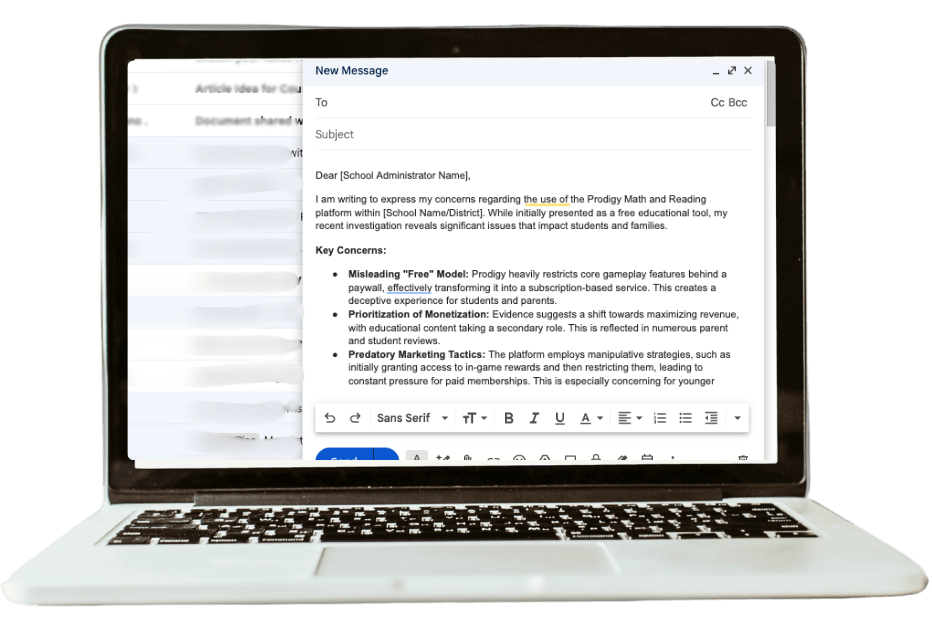Most adults will readily admit that their phones affect their attention. But what about attention in our kids? Most kids under ten aren’t getting phone notifications yet, but is their screen time still impacting their attention?
Attention and Brain Development
Attention is a skill that combines a variety of other skills. It requires abilities across multiple systems, including visual abilities, working memory, and sensory processing.
The ability to focus on one thing is dependent on learning how to ignore other things. As we develop, our brains learn how to discern between necessary and unnecessary stimuli.
Research shows that attention skills are established at their core by 6 months old, but the process of developing the many other skills necessary to “be attentive” is slow and steady throughout childhood.
During childhood, kids’ brains are making connections and maturing at lightning speeds, and on fascinatingly intricate levels. The connections that are forming between various regions of the brain are largely what support the new skills and abilities we see developing constantly in our kids throughout childhood.
The things our kids are exposed to affect the way their brains develop.
This can include life experiences, solid connection with a caregiver, nutrition, language, safety, and certainly, screens. Therefore, the link between screens and attention may be less about how screens “ruin” attention in kids, and more about how screens impede the processes that need to happen in the brain, to develop the attention skills they need.
Let’s look at two ways that screens can interfere with attention development.
Screens overstimulate with fast-paced programming
Media aimed at children is often created to move at a fast pace with loud noises and constant changes. Children, however, are not yet developmentally capable of processing such high levels of stimulation. Studies suggest that the demands that fast pace programs place on kid’s brains affect their attention and cognitive functioning in the immediate, and likely in the long-term.
One study found that children who watched just 9 minutes of a fast-paced cartoon performed significantly lower on a set of executive functioning tasks immediately after, compared to groups who watched an educational show or engaged in free drawing.
What is Executive Functioning?
Executive functioning skills refer to a group of abilities that allow us to sift through information, resist urges, create and change plans, and remember information. Executive functions are crucial to successful relationship building, academic learning, and success in structured environments like school and work.
Screens place a particularly high demand on underdeveloped executive functioning skills. As children’s brains struggle to make sense of highly stimulating media, a chain reaction occurs through the brain that research says leaves children more vulnerable to distractions and unable to focus on lengthy tasks (Betteridge, Chien, Hazels, & Simone, 2023).
A new study out of Singapore on brain waves, attention, and screen exposure for babies revealed that with every hour increase in average screen time at 12 months old, the children studied had more difficulties with attention and struggled more with executive functioning by age 9.
Screens provide instant gratification
Interactive screens are designed to provide quick gratification to promote continued satisfaction and use. Tablet games and Apps are skillfully and thoughtfully made to keep little viewers engaged by providing constant rewards. When playing games, children are frequently shifting their attention to new challenges or images rather than staying on one task for too long.
Learning to read, write, and follow multi-step directions requires high-level attention and retention. The young brain is trying to form connections that support the formation of these skills, but screens are giving them conflicting input. This can lead to lower frustration tolerance when real-life tasks don’t come easily or quickly. Resilience, tolerance, and patience all play key roles in keeping kids attentive.
Protecting attention skills when using screens
There are a variety of ways to allow our kids access to screens while promoting healthy development of executive functions and attention.
- Stick to the American Academy of Pediatrics guidelines on daily screen time for kids. Common Sense Media also has great suggestions for healthy media intake for little ones.
- Choose content with intention, and observe the effects of different forms of media on your child. For example, maybe your child exhibits more hyperactive behaviors after watching certain television shows. Maybe your child shows increased distractibility or lack of focus after using a tablet, but not after watching television. Take note of behavior trends that can shed light on what programs or games are over-stimulating or irritating to their developing brains.
- Choose content that is slower and quieter, particularly for preschool-aged children and younger. Parents.com offers a great list of television shows on various streaming platforms that are aimed at providing educational content at a more digestible pace.
- Provide a playful childhood. Time connecting with a caregiver and engaging in attention-promoting games and activities all help to boost appropriate executive functioning skills. Some examples include…
The more language babies and toddlers hear, the better. What we say can also help them develop attention and executive functions. For example, “I’m packing up for the park. First, I’m going to the bathroom. Then I will put our snacks in our backpack. Next, we’ll both get our socks and shoes on. Then we’ll get you in your car seat! What should we listen to while we drive?” Not only are you teaching language and helping to set expectations, you are also demonstrating and modelling how to create and execute a multi-step plan.
In Conclusion
Attention is a vital skill for success as children mature. With the right knowledge, we can make choices with our children’s screen time that better support their growth and development.

Authored by: Courtney G. DiStefano, CCLS
Courtney G. DiStefano is a Certified Child Life Specialist, child development expert, and mom of three with nearly fifteen years of clinical experience serving children and families in hospitals and social-service settings.




